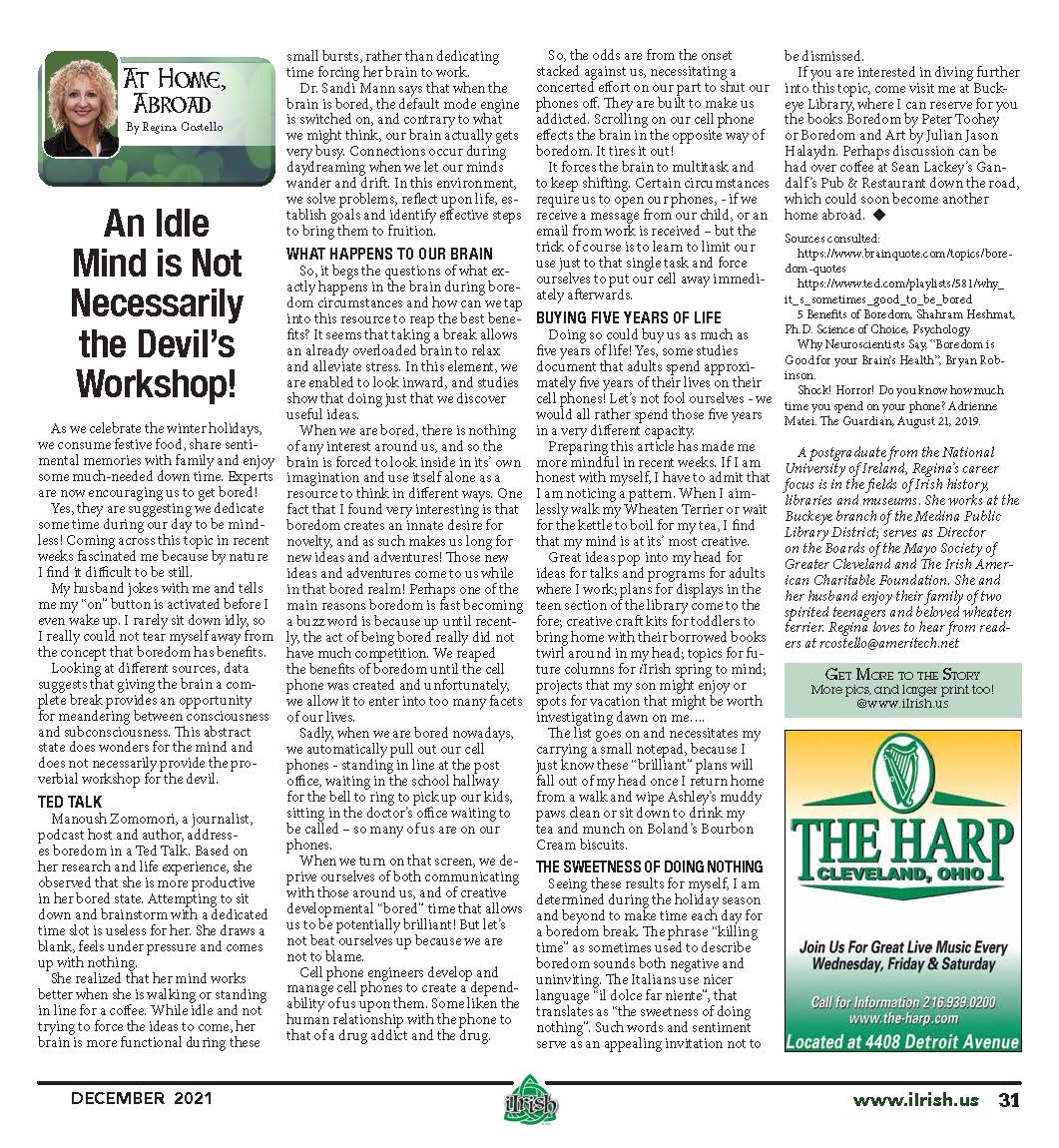
 At Home Abroad: An Idle Mind is Not Necessarily the Devil’s Workshop!
At Home Abroad: An Idle Mind is Not Necessarily the Devil’s Workshop!
By Regina Costello
As we celebrate the winter holidays, we consume festive food, share sentimental memories with family and enjoy some much-needed down time. Experts are now encouraging us to get bored!
Yes, they are suggesting we dedicate some time during our day to be mindless! Coming across this topic in recent weeks fascinated me because by nature I find it difficult to be still.
My husband jokes with me and tells me my “on” button is activated before I even wake up. I rarely sit down idly, so I really could not tear myself away from the concept that boredom has benefits.
Looking at different sources, data suggests that giving the brain a complete break provides an opportunity for meandering between consciousness and subconsciousness. This abstract state does wonders for the mind and does not necessarily provide the proverbial workshop for the devil.
Ted Talk
Manoush Zomomori, a journalist, podcast host and author, addresses boredom in a Ted Talk. Based on her research and life experience, she observed that she is more productive in her bored state. Attempting to sit down and brainstorm with a dedicated time slot is useless for her. She draws a blank, feels under pressure and comes up with nothing.
She realized that her mind works better when she is walking or standing in line for a coffee. While idle and not trying to force the ideas to come, her brain is more functional during these small bursts, rather than dedicating time forcing her brain to work.
Dr. Sandi Mann says that when the brain is bored, the default mode engine is switched on, and contrary to what we might think, our brain actually gets very busy.
Connections occur during daydreaming when we let our minds wander and drift. In this environment, we solve problems, reflect upon life, establish goals and identify effective steps to bring them to fruition.
What Happens to Our Brain
So, it begs the questions of what exactly happens in the brain during boredom circumstances and how can we tap into this resource to reap the best benefits? It seems that taking a break allows an already overloaded brain to relax and alleviate stress. In this element, we are enabled to look inward, and studies show that doing just that we discover useful ideas.
When we are bored, there is nothing of any interest around us, and so the brain is forced to look inside in its’ own imagination and use itself alone as a resource to think in different ways. One fact that I found very interesting is that boredom creates an innate desire for novelty, and as such makes us long for new ideas and adventures!
Those new ideas and adventures come to us while in that bored realm! Perhaps one of the main reasons boredom is fast becoming a buzz word is because up until recently, the act of being bored really did not have much competition. We reaped the benefits of boredom until the cell phone was created and unfortunately, we allow it to enter into too many facets of our lives.
Sadly, when we are bored nowadays, we automatically pull out our cell phones – standing in line at the post office, waiting in the school hallway for the bell to ring to pick up our kids, sitting in the doctor’s office waiting to be called – so many of us are on our phones.
When we turn on that screen, we deprive ourselves of both communicating with those around us, and of creative developmental “bored” time that allows us to be potentially brilliant! But let’s not beat ourselves up because we are not to blame.
Cell phone engineers develop and manage cell phones to create a dependability of us upon them. Some liken the human relationship with the phone to that of a drug addict and the drug.
So, the odds are from the onset stacked against us, necessitating a concerted effort on our part to shut our phones off. They are built to make us addicted. Scrolling on our cell phone effects the brain in the opposite way of boredom. It tires it out!
It forces the brain to multitask and to keep shifting. Certain circumstances require us to open our phones, – if we receive a message from our child, or an email from work is received – but the trick of course is to learn to limit our use just to that single task and force ourselves to put our cell away immediately afterwards.
Buying Five Years of Life
Doing so could buy us as much as five years of life! Yes, some studies document that adults spend approximately five years of their lives on their cell phones! Let’s not fool ourselves – we would all rather spend those five years in a very different capacity.
Preparing this article has made me more mindful in recent weeks. If I am honest with myself, I have to admit that I am noticing a pattern. When I aimlessly walk my Wheaten Terrier or wait for the kettle to boil for my tea, I find that my mind is at its’ most creative.
Great ideas pop into my head for ideas for talks and programs for adults where I work; plans for displays in the teen section of the library come to the fore; creative craft kits for toddlers to bring home with their borrowed books twirl around in my head; topics for future columns for iIrish spring to mind; projects that my son might enjoy or spots for vacation that might be worth investigating dawn on me….
The list goes on and necessitates my carrying a small notepad, because I just know these “brilliant” plans will fall out of my head once I return home from a walk and wipe Ashley’s muddy paws clean or sit down to drink my tea and munch on Boland’s Bourbon Cream biscuits.
The Sweetness of Doing Nothing
Seeing these results for myself, I am determined during the holiday season and beyond to make time each day for a boredom break. The phrase “killing time” as sometimes used to describe boredom sounds both negative and uninviting. The Italians use nicer language “il dolce far niente”, that translates as “the sweetness of doing nothing”. Such words and sentiment serve as an appealing invitation not to be dismissed.
If you are interested in diving further into this topic, come visit me at Buckeye Library, where I can reserve for you the books Boredom by Peter Toohey or Boredom and Art by Julian Jason Halaydn. Perhaps discussion can be had over coffee at Sean Lackey’s Gandalf’s Pub & Restaurant down the road, which could soon become another home abroad.
Sources consulted:
https://www.brainquote.com/topics/boredom-quotes
https://www.ted.com/playlists/581/why_it_s_sometimes_good_to_be_bored
5 Benefits of Boredom, Shahram Heshmat, Ph.D. Science of Choice, Psychology
Why Neuroscientists Say, “Boredom is Good for your Brain’s Health”, Bryan Robinson.
Shock! Horror! Do you know how much time you spend on your phone? Adrienne Matei. The Guardian, August 21, 2019.
*A postgraduate from the National University of Ireland, Regina’s career focus is in the fields of Irish history, libraries and museums. She works at the Buckeye branch of the Medina Public Library District; serves as Director on the Boards of the Mayo Society of Greater Cleveland and The Irish American Charitable Foundation. She and her husband enjoy their family of two spirited teenagers and beloved wheaten terrier. Regina loves to hear from readers at [email protected]


Monthly newsmagazine serving people of Irish descent from Cleveland to Clearwater. We cover the movers, shakers & music makers each and every month.
Since our 2006 inception, iIrish has donated more than $376,000 to local and national charities.
GET UPDATES ON THE SERIOUS & THE SHENANIGANS!